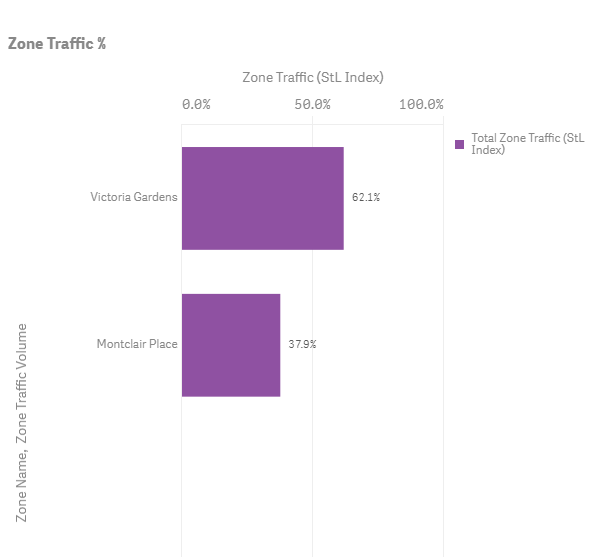
Shopping Mall Statistics Reveal Secrets to Modern Retail Success

From Amazon to Walmart, retail statistics tell us that American shopping habits have changed. Online shopping now accounts for more than 14% of total retail sales. But e-commerce will never replace the in-person experience that brick-and-mortar shopping malls can provide. To stay competitive, it’s time for modern malls to double down on their personalized advantage.
When malls and shopping centers close their doors, towns and cities don’t just lose a place to shop, but people lose a place to connect face-to-face, and communities lose employers. At StreetLight, we know how important shopping malls are for our communities, and we’re committed to collecting the statistics modern malls need to thrive.
The Makings of a Modern Mall
The initial inspiration for this blog began because I actually attended college near two malls: Victoria Gardens in Rancho Cucamonga, CA and Montclair Place in Montclair, CA. When I was in college, I found myself more often than not, driving an extra 15 minutes to go to Victoria Gardens, rather than driving only 10 minutes to Montclair Place.
I found the experience of Victoria Gardens more pleasant and worth slogging through some LA traffic to go walk around a well-designed mall. My hypothesis was that modern malls like Victoria Gardens are pivoting to become thriving community assets by focusing on three tactics:
- Turning modern malls into more of an experience.
- Merging community and retail.
- Embracing the aspects of shopping that e-commerce cannot replicate.
I knew why I personally liked going to Victoria Gardens more — despite the fact that stores between the two malls were similar — but wanted to understand if others made a similar decision. Collecting shopping mall statistics using Big Data supported my hypothesis.
Statistics Reveal Shopping Mall Visitorship
By using our Home and Work Locations metric, I was able to analyze shopping mall statistics for these two malls. They are located about thirty minutes from one another and have similar stores, but Big Data told me that Victoria Gardens had a much higher visitation rate:
Figure 1: Average weekend day visitor rates for Victoria Gardens and Montclair Place shopping malls.
When looking at the mall visitor statistics, we can see that, on an average weekend in 2018, 62.1% of visitors went to Victoria Gardens compared to Montclair Plaza which only had 37.9% of visitors. We were also able to look at the demographics of visitors to the two shopping malls.
Figure 2: Average weekend day visitors to Montclair Plaza mall.
Figure 3. Average weekend day visitors to Victoria Gardens mall.
While the two malls have some slight variation in the demographics for visitors who shop there, the difference is not significant enough to account for the much higher visitation to Victoria Gardens overall. This pushed me to look into what was truly different about these two malls, and what might actually drive (literally) more folks to visit one over the other.
From my experience of visiting both locations, Victoria Gardens has put in a lot of effort to make those key pivots to become a modern mall. The data analysis reinforced my instinct that those efforts are attracting other visitors as well.
Why One Mall Attracts More Visitors
Consumers today are buying more experiences than durable goods. Millennials care a lot more about having new, Instagram-able experiences than luxury handbags. The cookie-cutter shopping meccas that past generations gravitated towards all look the same, but statistics from our analysis show that successful shopping malls are taking a cue from the past and focusing on what makes in-person visits enjoyable.
For example, Victoria Gardens has embraced the beautiful Southern California weather and branded itself as an outdoor retail hub rather than a traditional mall. It has pedestrian-friendly walkways, outdoor seating, and all the shops have an outdoor storefront. It reframed how a mall functions and made shopping mall visits less about convenience and more about community.
The development of Victoria Gardens was an effort by the City of Rancho Cucamonga to create the greater Victoria Gardens Cultural Center. Focusing from the beginning on a combination of culture, community, and retail invites more types of folks to visit the area to enjoy themselves in many ways — shopping, going to a movie, checking out a library book, or even seeing a show.
Measuring Results with Shopping Mall Statistics
At the end of the day, results are what matters. Shopping mall statistics should be able to tell you if new industries and experiences bringing more people into your shopping center. Are those new visitors also members of the demographic groups you targeted? Did your efforts pay off?
Using Big Data to quickly and easily measure the volume and breakdown of your visitors as you try different solutions, you can drill down on what moves the needle in your community.
By the way, on my last visit to Montclair Place, I noticed that they seem to be catching up to the pivots that other malls in America are making. They are adding experiences such as a movie theater, a music and entertainment venue, a large playground, and more! I guess we will have to check back in a few years and see how visitation changes.


